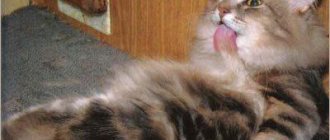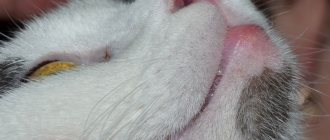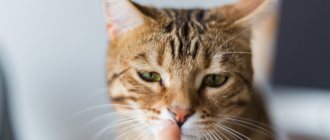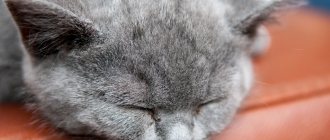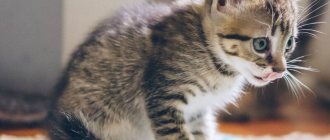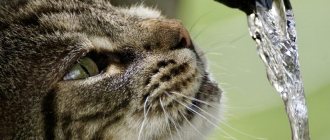A caring owner is concerned about why the cat has become lethargic and sleeps all the time. This condition occurs in kittens and adult cats. There can be many reasons. To find out what it is connected with, you need to contact a veterinarian and conduct a series of diagnostic tests. If you do nothing, serious complications are possible, including death.
Why is the cat acting lethargic?
This state means complete indifference to the environment, weakness, drowsiness, the animal lies all the time, does not react to the outside world, perhaps even refuses to eat. Lethargy in cats occurs for the following reasons:
- middle age;
- taking medications;
- decrease in hemoglobin in the blood;
- heart and vascular diseases;
- inflammatory processes, infections;
- injuries;
- tumors;
- neurological diseases;
- disruption of hormone levels and endocrine system;
- helminths;
- piroplasmosis;
- being in a stuffy room.
Reasons not to worry
There are many reasons why a cat may be apathetic, sleepy and indifferent to what is happening. However, not all of them are cause for concern.
Such reasons include:
- Fatigue after long and active games.
- Laziness after a heavy meal.
- Lethargy and apathy after sterilization, castration or other surgery. In the absence of additional symptoms, this is normal if it lasts no more than 48 hours.
- Hot weather can cause your animal to become lethargic.
- Cold weather is also not conducive to activity. As a rule, during this period cats hide in warm places and sleep a lot.
- After vaccination, animals may be lethargic for 36 hours.
- During pregnancy, cats tend to move less and rest more, and this is normal.
- Some medications can cause drowsiness.
- Older cats can also be lazy, lethargic, and prefer to sleep most of the time.
Diseases accompanied by lethargy
Anemia and apathy
A pet's lethargic state can be caused by a low level of hemoglobin, which is caused by poor nutrition.
The cat has become less active, has stopped enjoying life normally, is not eating well, the mucous membranes have become pale - one of the reasons may be anemia. This means that there is a decrease in the number of red blood cells and hemoglobin in the pet’s blood. Factors that contribute to anemia can be both poor diet and various diseases.
Stomach diseases
If the cat does not eat well and sleeps constantly, he experiences periodic vomiting, diarrhea, he has become passive, it is necessary to check the organs of the gastrointestinal tract. The cat becomes weak. Perhaps she will eat inedible objects. When nauseated, swallows fur or balls of hair to induce vomiting.
Diseases of the cardiovascular system
The reasons are completely different. Most often develop after an infectious disease. The cat becomes apathetic, lethargic, eats poorly, plays little, blood pressure is low, and breathing is rapid. The mucous membranes become bluish in color. Swelling appears. There may be an increase in body temperature, the cat is hot to the touch and sad. In severe cases, the weight sharply decreases or increases. The animal trembles, drinks a lot, breathes heavily with its mouth open, hides from people, and does not get up.
Infections and inflammation
Infectious inflammations are accompanied by symptoms such as coughing or vomiting.
Diseases of an infectious and inflammatory nature are manifested by changes in the cat’s behavior. He eats nothing all day, lies inactive, and hardly plays. This passive state is accompanied by other signs. In case of kidney ailments - swelling of the cat's face, paws, rapid breathing, she often goes to the toilet, vomiting and weight loss are possible. Rhinotracheitis occurs similarly to a respiratory infection in humans. Accompanied by nasal congestion, cough, watery eyes, the cat is hot, the mucous membranes of the nose and throat are swollen. The nose is dry and cold.
Piroplasmosis
The carrier is ticks infected with Babesia. Most often they bite unvaccinated cats during the peak of activity, that is, in spring and autumn. Pets develop weakness and become apathetic. The cat eats little and sleeps a lot. A complete refusal of food is possible. A high temperature and pallor of the mucous membranes appear. The urine becomes dark or red. If treatment is not started at an early stage, the animal will die.
Tumor processes
In cats, like in people, education does not make itself felt for a long time. You need to pay attention to your pet’s health in order to recognize it in time. The cat has become lethargic, sad, apathetic, lies constantly, and rarely plays. Usually body weight falls, diarrhea and vomiting occur. With a brain tumor, neurological disorders appear (lethargy, hallucinations, seizures). Sometimes lethargy sets in.
Normal sleep duration for an animal
Like human offspring, kittens sleep almost all the time, interrupting only to feed. This is completely normal, because their body is still very weak. In their sleep they grow and become stronger. A slightly older cub sleeps less, but still at least half a day.
An adult cat sleeps about the same amount or a little less/more. It is impossible to give an exact figure, because all animals have a pronounced individuality. Much depends on the character. Some cats are energetic, active, they play a lot and have fun. Others are inert, lethargic, prone to weight gain and much less active than their vigorous counterparts. Most of the time they just sleep.
There is a popular expression: “sleeps like a cat with half an eye.” This is a very apt remark. Unlike humans, who must sleep at least 7-8 hours in a row to restore energy, cats sleep in “short intervals.” On average, they simply doze for most of the time without losing their alertness. As soon as the slightest rustle is heard, the cats immediately wake up.
All sleep in cats is divided into two phases:
- Nap, superficial “slow” sleep – 20-30 minutes.
- Deep, “fast” sleep – 5-7 minutes. At this time, animals, like people, dream. Cat owners are well aware of this, since a sleeping pet can twitch its paws in its sleep, “run” and even meow. All this clearly indicates the presence of dreams.
The duration of sleep can be influenced by various external factors, for example, extreme fatigue, stress, changes in temperature. Physiology also influences the duration of rest. Pregnant cats sleep much more - this is a need for the body experiencing increased stress.
Other reasons
Helminthiasis
If parasites enter a cat's body, it may experience health problems such as diarrhea or hair loss.
The disease is caused by parasites - worms. They can be present in grass, food, soil, water. Once in the animal's body, they use it for survival. The cat has health problems. Symptoms depend on the degree of worm infestation. The cat does not eat, vomiting, diarrhea, cough, hair loss, rashes appear, the pet scratches its butt near the anus. The tummy gets bigger. Symptoms of intoxication appear.
Age of the cat
An old cat becomes lethargic, sleeps a lot, plays little, appetite, hearing, vision and smell are impaired. The fur becomes dull. As an animal ages, its behavior changes. Or the pet becomes more affectionate, climbs into your arms, caresses. Or, on the contrary, he shows nervousness and aggression. The immunity of cats decreases, which is why they are susceptible to infections.
Vaccinations for babies
Vaccination protects animals well from various diseases. However, complications may occur. Both allergies and individual reactions. After vaccination, the kitten eats poorly, is lethargic, drowsy, refuses to eat, and the temperature rises. The nose becomes hot or cold. If these symptoms last more than 3 days or are too severe. you need to contact your veterinarian.
The origin of the cat's long sleep
Cats are originally nocturnal animals. This is how their distant ancestors were, and this is how modern mustachios-striped animals remain. This quality is especially familiar to residents of rural areas, private houses and summer cottages. Living in complete or partial freedom, cats come home only to eat and sleep, preferring to travel or hunt at night.
Domestic cats, who live indoors all their lives, rarely roam around the apartment at night, so they sleep much more than their more free-spirited counterparts. For them, significant daytime sleep is simply necessary, as the body needs to recover and digest the prey. How domestic fluffies sleep so much and maintain the flexibility of the spine and joints, the elasticity of muscles with little physical activity is a mystery that has not yet been solved by scientists.
Diagnostics
At the appointment, the veterinarian collects an anamnesis from the owner, what the animal did and ate, and then carries out diagnostic procedures.
There are methods that will allow you to make a correct diagnosis and find out why your beloved animals are sick:
- It is necessary to find out what the owner associates the disease with. What did the cat eat, where was it, did it walk outside, what medications did it take. That is, collect anamnesis.
- The doctor takes tests - general blood and urine, biochemistry, feces for coprogram and worm eggs.
- Depending on the symptoms, additional examinations are prescribed - ultrasound, x-rays, surgical diagnostic intervention.
If your cat begins to eat little due to kidney failure
There are two types of kidney failure in cats - acute and chronic, which are characterized by refusal to eat. There is severe emaciation of the animal, frequent vomiting and urination, as well as a constant feeling of thirst. A common cause of this condition may be poisoning from flowers of the lily family. The condition of acute renal failure can be treated with timely contact with an experienced veterinarian. Resuscitation facilities and prompt implementation of treatment procedures will help restore your pet’s health in the shortest possible time.
How to treat a pet?
To cure a disease, the cause must be eliminated.
If it is caused by taking medications, stop taking it. For helminthiases, the cat is given a drug that removes them. They go to the toilet and the worms will come out along with the feces. Piroplasmosis is treated with special substances that kill Babesia. In case of inflammation and infections, you need to relieve this process with anti-inflammatory or antibiotics. Maintenance therapy and pills to boost immunity are used. Only a doctor can identify the cause and prescribe the correct treatment.
Reasons for refusal to eat due to cat illness
Oral diseases. Stomatitis is an inflammation of the oral mucosa involving the mucous membranes of the cheeks, palate, gums, surface of the tongue and the mucous membrane of the lips. In cats, catarrhal, vesicular and hemorrhagic most often occur, and much less often ulcerative, diphtheretic and phlegmonous.
Stomatitis in a cat usually begins with catarrhal inflammation of the oral mucosa and is accompanied by: Increased salivation. Increased thirst. Chew carefully while eating (cat stomatitis).
Dental caries is a disease accompanied by progressive putrefactive destruction of hard tissues followed by the formation of a cavity in the affected tooth. The onset of dental caries development is usually overlooked by cat owners. The owner of a cat can detect dental caries in his cat due to difficulty in eating and chewing food, as a result of the appearance of a pain reaction, the presence of salivation, the loss of swallowed food particles from the oral cavity and an unpleasant odor (bad breath in a cat) that comes from the cat’s oral cavity, purulent or bloody discharge from the mouth.
Tartar. An unpleasant odor emanates from the cat’s mouth, we note atypical behavior in the cat when eating (arising from pain), the cat begins to refuse food, and exhaustion is observed (tartar in the cat).
Wounds and abscesses in the cat's mouth are accompanied by pain, which makes it difficult for the cat to eat, and as a result the cat refuses to eat.
Ear disease. Ear diseases in cats can be non-contagious or contagious in origin.
Otitis. Otitis in cats can be due to inflammation of the outer, middle and inner ear.
Causes of otitis. The cause of otitis in cats can be food allergies, the presence of parasites (ticks, fleas), ear injuries, foreign bodies, etc. Otitis of the middle and inner ear can be the result of complications of inflammation of the outer ear.
Signs of otitis. During a clinical examination of a sick cat, the skin of the sore ear is reddened, the cat rubs the sore ear with its paw, and tries to keep the sore ear folded and pressed to its head. If the pain in the ear is acute, “shooting,” the cat suddenly jumps up, looks around in fear, and screams. With constant pain, the cat does not allow the sore ear to be touched, avoids stroking the head, and presses the sore ear to its bedding. With purulent otitis media, inflammatory exudate is released from the cat's ear; when touched, the ear gurgles and squelches. An unpleasant odor emanates from the diseased ear. In advanced cases, in the absence of proper treatment, the cat’s body temperature rises, the cat becomes depressed, and there is no appetite. If timely treatment measures are not taken, the eardrum may be perforated, and the inflammatory process can spread to the brain (ear diseases in cats).
Stress
Moving to a new home is stressful for everyone, and you shouldn't overlook the potentially dangerous anxiety it can cause in your feline friend. Once you move in, the litter box may be one of the few things your cat learns: a litter box of stability in ever-changing environments, rather than just a place to pee and poop.
In this case, most cats will eventually climb out of the litter box on their own. This may take several days and almost certainly until most of the heavy lifting and loud noises stop.
Lay out the bed and blanket you had in your old home, even if you're going to buy everything new. This will provide your cat with a confidently recognizable place to stay.
© shutterstock
Territoriality
Introducing a new cat or dog into your home is not only stressful, but can also cause territorial issues. If your cat is worried that a new family member will try to steal the litter box, he can lie in it or even sleep in it to prevent the new family member from using it.
Ideally, you should have one litter box per cat, plus one extra litter box in your home. This will ensure that all your cats always have a tray they can use. If you don't have many litter boxes, consider adding one more to minimize territorial issues.
Boredom
Much of your cat's behavior can be explained by boredom: if your cat walks across the counter, knocking everything over with its paw, it's likely boredom. If they attack your feet as you walk by, it can cause boredom.
If they are playing in the litter box, it may be a good sign that they are tired of the catnip-filled toy mouse you brought home an hour ago. Buy them a new toy to get them excited. Interact with them. They will most likely leave their urine-stained playpen when they have something better to do.
What should an owner do if a cat doesn’t eat well?
First of all, you need to decide whether the owner is able to help the pet on his own. If yes, then you need to do as described above.
If a combination of the following symptoms occurs, seek veterinary help:
- the pet does not drink or eat;
- the cat is reluctant to chew food and has difficulty swallowing;
- halitosis - bad odor from the mouth;
- the cat constantly licks itself;
- diarrhea or stool retention develops;
- salivation;
- vomit;
- the coat is tousled and dull;
- skin rashes;
- conjunctivitis, rhinitis and dry nose at the same time.
Emergency assistance before the veterinarian arrives
At the first signs of refusal to eat, the main thing is not to panic and try to soberly approach the issue of determining the reasons:
- Eliminate the possibility of purchasing unsuitable food
- Try replacing food
- Call emergency veterinary help
- Do not start self-medication
- Test your cat's sense of smell while giving her warm food from your hand.
- Watch the cat, especially if you are in a suburban area - maybe the cat ate a mouse or ate from the neighbors
- Avoid pet overeating
Every owner of a cat must remember that neglect of a pet can affect the occurrence of poor appetite and the development of dangerous diseases. Contacting a veterinary clinic when the first symptoms of food refusal appear will help the veterinarian quickly make a final diagnosis and prescribe the most effective treatment. The health of your pets is in your hands, and attention and care will help prevent the appearance of the above-described signs associated with loss of appetite.
When a cat's condition should cause alarm
The owner of the animal should be wary of prolonged fasting. For kittens the critical period is one day, for older pets - 2; cats for three days. An alarming sign is refusal to drink, a drop in temperature below normal, and excessive salivation.
Be sure to read:
What to do, the cat is sneezing, the eyes are watery or festering, reasons
In such situations, emergency veterinary care is required.
How and how to help an animal
If a cat refuses food and water, then the first thing to do is take your pet to a veterinarian. It is not possible to make a diagnosis on your own at home, so you need to call a doctor at home or take your pet to the clinic.
If it is impossible to get to the veterinarian in the next 24 hours, then you need to provide the cat with rest. To do this, you should prepare a clean litter; it should not be too soft or too hard. If an animal is hiding, you should not force it out of its hiding place. You can only place a bowl of food and fresh water nearby.
Bowls of water and food should always be available to the animal.
If the doctor has determined the cause, then you should follow the specialist’s recommendations and give medications according to instructions in the required dosages. This must be done calmly; you must not cause pain to the animal. Before giving medication, the cat needs to be stroked, and the tone of voice should be calm. This way, the pet will tolerate the treatment better, will not resist too much and will recover faster.
Additional recommendations:
- If the cause is stress, then the cat should be left alone for a while. It is advisable to call her to eat in a gentle tone. A calm and quiet environment, the absence of extraneous noise and periodic stroking will help you recover from stress.
- If your pet doesn't like the food, you need to replace it as soon as possible. It is recommended to give preference to balanced foods rather than cheap options containing a lot of harmful additives.
- In case of gastrointestinal upset and poisoning, you can give the animal activated charcoal (500 mg per 1 kg of weight). In this case, the tablet must be crushed and dissolved in 1 tsp. water. It is most convenient to give medicine using a syringe without a needle. It is enough to do this procedure once before seeing a doctor.
- Ticks and fleas are eliminated using special antiparasitic medications. You should not use them on your own; you should first consult your doctor. However, if this is not possible in the near future, and the animal has fleas or a tick is found, you can purchase Bars or Celandine shampoo.
- If the cause is helminthic infestations, then treatment is carried out with the help of anthelmintic drugs. The medication should be given only according to the regimen recommended by the doctor. Otherwise, larvae may remain, which will provoke a relapse.
- To alleviate the condition of an animal with gum inflammation, you can use a solution of Miramistin or potassium permanganate. It is necessary to treat the gums using a cotton pad and the selected product. This needs to be done 2 times a day. Do not press on problem areas.
A weak solution of potassium permanganate can be used to treat inflamed gums
If an animal does not eat or drink, and also sleeps constantly, then this is an alarming signal of serious health problems. However, in extremely rare cases this is associated with stress. In this case, the pet should be left alone and allowed to rest. There is no danger in inactivity after stress. If the animal is lethargic, does not eat or drink for another reason, then postponing a visit to the doctor is dangerous, since with a serious pathology the cat may die.
Some recommendations that will help you hold out until the doctor arrives:
- It is necessary to ensure that fresh air enters the room.
- Do not disturb the pet. If there are other animals in the house, then for safety reasons it is better to isolate them from contact with the sick cat.
- Make sure the water in the bowl is always clean.
- If there is a special medicinal herb for cats in the house, which breeders often grow in pots, then you can pick a little and put it next to your pet. If desired, the animal can be treated with such a safe remedy.
How to help a kitten
If the kitten does not eat anything or drink water, then first of all you need to pay attention to the nature of the food. Small pets need special soft food. It is impossible to give a kitten food intended for adult animals, since the gastrointestinal tract of babies is still very weak. Long-term refusal of water is dangerous, so you can give your pet water using a pipette. Every hour you need to give water forcibly. The liquid should be administered in small quantities - one pipette at a time is enough.
Giving your kitten water using a pipette will prevent dehydration
In addition, the kitten should be carefully examined for rashes, sores and fleas. Particular attention should be paid to the withers and ears. If everything is clean, then most likely the problem lies in the functioning of the internal organs, which can only be determined in a clinical setting.


